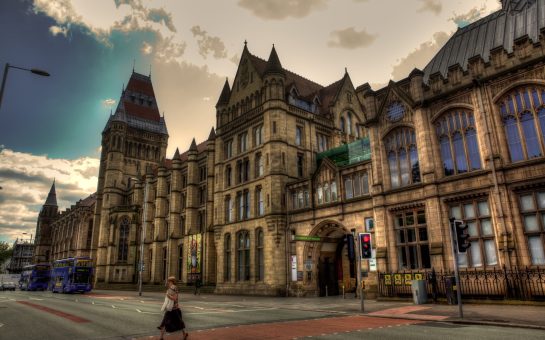The majority of people live their lives in a cage of expectation, convention and societal restrictions.
That’s according to ‘transformational thinker’ Alan Forrest-Smith, from Edinburgh, who labels this world of incarcerated potential ‘Zoomanity’.
Later this year, Alan will speak at Manchester Art Gallery on the philosophies, observations and beliefs that form the basis of his book Escape from Zoomanity and its forthcoming sequel Return to Zoomanity.
Ahead of this event MM spoke to Alan about Escape from Zoomanity, his relationship with religion and the perilous trappings of modern life.
So, what is Alan’s concept of ‘Zoomanity’, is it what the layman might simply refer to as ‘conformity’?
“The idea I had when I wrote this book was that everybody’s trapped by something,” Alan explained.
— Alan Forrest Smith (@alanforrestsmit) July 22, 2013
“But a lot of those restraints are put in place by society as unwritten expectations that are not really in harmony with the way we think we live our life.”
Alan accepts that some level of conformity is required in order for society to function.
“It’s really the things that go against the natural grain of a human being,” he said.
The former hairdresser, who cites Tolstoy and Dostoyevsky as influences on his philosophies, describes people who have escaped from ‘Zoomanity’ as ‘people who have become who they really are’.
“Most of us either live in an expectation, or we live on autopilot, or we do other things we’re expected to,” he told MM: “We wake up, we go to work, we get home and before we know it we’re 55/60.
“It’s more of a natural state based on an internal feel rather than anything structuralised or written.”
Alan believs it is a sad fact of life that the vast majority of people are forced to compromise in order to keep a roof over their head and put food on the table.
http://t.co/YxHRexje pic.twitter.com/80mlyeuF
— Alan Forrest Smith (@alanforrestsmit) July 20, 2012
“The way I explain it in the book is we say we go to the zoo to see a wild animal, but the truth is you don’t see a wild animal in the zoo – it’s not a wild animal at all,” Alan said.
“A wild elephant is an animal that walks 50 miles every day, and pulls up trees. In a zoo somebody throws a bale of hay over the wall.”
This analogy with animals in captivity is where Alan’s concepts of ‘Zoomanity’ and the ‘Zooman’ come from.
“The zoo gives an animal everything it needs to survive, but the lifespan of the animal is shortened dramatically,” he explains.
“So the comparison with humanity – which is now ‘Zoomanity’ – is a human is given everything it needs to survive, but it really doesn’t live to its full potential, because really we just live a survival lifestyle rather than a thriving lifestyle.”
Alan admits to enjoying watching television as much as the next man, but believes the media plays a key role in keeping the masses ‘placated’, ‘dumbed-down’ and under control.
“At the end of the day the things that get fed to us through the media are really designed to keep us buying or reading that media. Or they’re designed to keep us in fear or transfixed,” he said.
http://t.co/YxHRexje pic.twitter.com/N9cQXZfJ
— Alan Forrest Smith (@alanforrestsmit) July 20, 2012
“I mean some people have real time conversations about soap operas. It’s not even real.”
And the all pervasive influence of social media and technology on the younger generation has not gone unnoticed by Alan. He describes it as an ‘endless screed of nonsense’.
“Quite honestly it’s worse than ever,” he told MM. “At one time the problem was too much TV, but now – I only have to look at my own children – they can have two screens, three screens, four screens all on the go at once.
“So the problem really is, sometimes if you have a really difficult problem to solve you have to take time to just completely unplug.
“Just so your mind can adjust to the problem that’s facing it, but the solution to the problem is usually there.”
Alan doesn’t consider himself a conspiracy theorist, though he describes the current state of affairs as ‘well thought out reality’ that keeps the masses subdued.
“Some people will just wake up, they’ll go to work, they’ll come home, they’ll eat and they’ll go to bed. And they’ll do that until they die,” he said.
“But every now and again it only takes one or two to think to themselves ‘hang on what the hell is going on here’, and those are the ones who break away.”
http://t.co/YxHRexje pic.twitter.com/I3Y7zam4
— Alan Forrest Smith (@alanforrestsmit) July 24, 2012
So who are the ‘Zookeepers’ Alan refers to in his book? Broadly speaking, Alan breaks these down into three catagories – Government’s, businesses and churches.
“I think a lot of institutions that control are the ‘zookeepers’. Because a lot of the time we’re under control but we don’t realise we’re under control.
“But sometimes the controls can be in your family life or even in the street that you live in or your job.”
Alan, who was a practising Jehovah’s Witness for 20 years, has been described as a philosopher and a visionary, doesn’t label himself as anything these days but.
“People have said all kinds of things. I personally wouldn’t say anything,” he said.
“What I do know is I give everything a lot of thought, I turn things upside down as much as I can, I look into everything as much as I can and come to an informed decision.
“But am I a philosopher? I have no idea.”
Alan will give a talk based on his forthcoming book Return to Zoomanity in Manchester later this year, with the likely venue being the Manchester Art Gallery.
Image courtesy of Alan Forrest Smith, via YouTube, with thanks.



